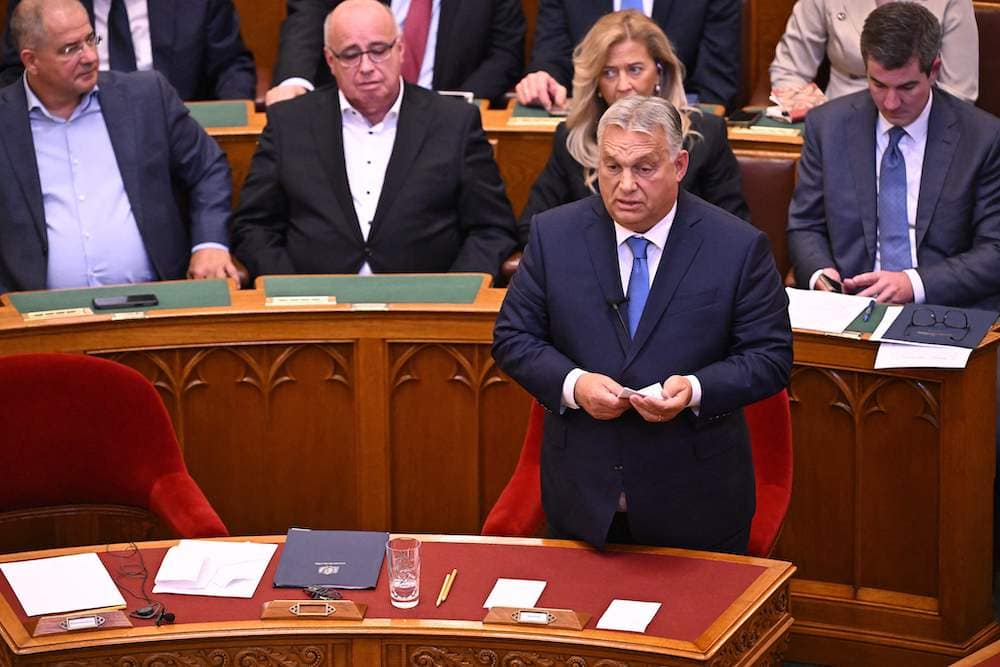Leading editors and journalists from independent press in Hungary warn that the law could be used to make life more difficult for those media critical of the government.
This statement was originally published on ipi.media on 13 December 2023.
New law will be harnessed to further harass and pressure independent media
The International Press Institute (IPI) today condemns the passing of the Sovereignty Protection Act by the Orbán government in Hungary without proper public consultation and calls for an EU challenge against the law.
After the bill was passed in the parliament on 12 December after just two weeks of debate, IPI renews our previous concerns about the detrimental impact the law will have on press freedom, particularly the stigmatisation of professional media which receive foreign funding.
While media are not named directly within the text, the intentionally vague language and broad scope for application of the law will effectively open the door to state-sponsored pressure on those media which receive foreign funding and produce journalism critical of the government, IPI said in a statement with MFRR partners.
In solidarity, IPI is republishing a statement issued today by leading editors and journalists representing independent media groups in the country, who warn that the law will be the latest tool in the arsenal of the government to make life more difficult for those media critical of the government.
The “Sovereignty Protection Authority” is harmful and against the rule of law, yet it cannot intimidate independent media
The newly adopted “Sovereignty Protection” law does not expressly regulate the operation of media companies, it is, however, capable of severely restricting the freedom of the press, potentially making it difficult or even impossible for independent newsrooms, journalists and media companies to operate.
The so-called “Sovereignty Protection Authority” will be an arbitrarily appointed body with unlimited powers, operating without any oversight. This office will have the means to threaten and harass the individuals and organizations it targets, in a way that is nominally lawful but in fact arbitrary. It does not even need sanctions to do so; the damage caused by investigations without limits or legal guarantees may in itself be enough to destroy those in the crosshairs.
This law makes it clear: in Hungary today, anyone who takes part in democratic debate or even simply informs the public is suspect to those in power.
Independent media outlets that obtain and report information in the public interest are repeatedly accused of serving “foreign interests”. This is a deliberate lie, which defames not only the newsrooms that do vital work for democracy, but also those Hungarians who watch, listen to and read their content, and support their operations financially. The operation of independent newsrooms, including their financial background, is public and transparent. There are no hidden funds or subsidies.
The creation of a “Sovereignty Protection Authority” that can collect unlimited data, can interrogate anyone, and can be used against anyone, is contrary to the most basic norms of the rule of law.
It goes against the human rights and democratic principles accepted by Hungary, and against common sense.
However, we, the undersigned independent media organizations, will not change the principles and practices of our operations: we will continue to work transparently, accountably and in accordance with the rules of our profession to ensure that the Hungarian people know what is happening in the country and why. This is our patriotic duty, and no “Authority” will deter us.
Why is the authority established by the act against the rule of law?
- The authority can open an investigation against any person or organization on the basis of its own decision without giving reasons.
- According to the text of the law, which uses undefined terms, such an investigation can be launched against anyone who is active in public life in the broadest sense.
- The organizations and persons under investigation, including all staff, regardless of their job title, are obliged to provide information to the authority.
- The same applies to anyone else who, although not the subject of the investigation, may be considered by the authority to be involved.
- The authority may also request information from any public or other body on anyone and anything without restriction.
- The authority is outside the jurisdiction of any redress forum, including the courts. Persons and organizations under investigation have nowhere to turn if they consider the investigation to be unjustified, conducted in bad faith or its findings to be unfounde.
We are united in our view that the law entitled “On the Protection of National Sovereignty” should not simply be corrected in its details, but entirely rejected.
It does not serve the information security of our society; on the contrary, it is meant to directly undermine it with its threat to free media and democratic debate in general.
Tamás Bodoky, atlatszo.hu
Endre Bojtár B., Magyar Narancs
Zsombor György, Magyar Hang
Márton Gulyás, Partizán
Tamás Német, Telex
András Pethő, Direkt36
Péter Uj, 444
Gábor Vajda, Qubit
The newsroom of Válasz Online
Blanka Zöldi, Lakmusz
IPI’s statement is part of the Media Freedom Rapid Response (MFRR), a Europe-wide mechanism which tracks, monitors and responds to violations of press and media freedom in EU Member States, Candidate Countries, and Ukraine. The project is co-funded by the European Commission.




